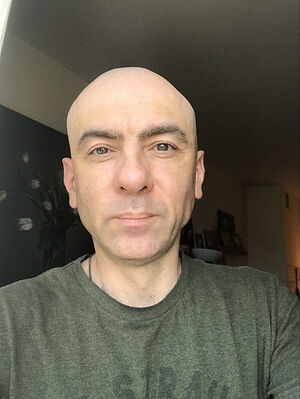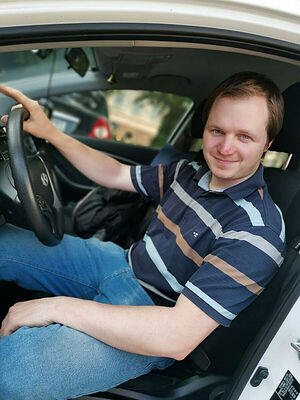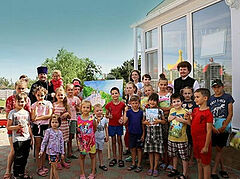For the last four months, everyone in the Church humanitarian assistance center in Moscow has operated without a single day off!
Day in and day out, the center receives people whose former lives in Donbas and Ukraine were forever altered by the terrible disaster that left them without homes, property, and often without family. The center has received more than thirteen thousand applications. It peaked in June—the center accepted two hundred and fifty families in a single day during that month. Four hundred and sixty people received humanitarian help then.
The refugees are trying to legalize their status, look for jobs and lodging. They come to the center to get food, medicine, and clothing, and—in search of consolation, they long to be heard. Certainly, any work on such a massive scale would be impossible without an active participation of the volunteers and their amazing dedication.
Alexey Krasnikov: “They share their grief with us—we absolutely must be able to hear them”
 Alexey Krasnikov The social service workers among the volunteers are first to hear those stories and see their tears. They register the refugees’ applications. When Alexey Krasnikov joined the center—it was the time when they needed the social service volunteers the most. He, an IT engineer, was tasked with working in direct contact with the refugees.
Alexey Krasnikov The social service workers among the volunteers are first to hear those stories and see their tears. They register the refugees’ applications. When Alexey Krasnikov joined the center—it was the time when they needed the social service volunteers the most. He, an IT engineer, was tasked with working in direct contact with the refugees.
“The refugees are just like us. They are ordinary people who suddenly ended up living in a different reality. I could happen to any of us! It is really hard to beg if you were very successful before. It is a totally different position…”
It is unbearably hard for those who were formerly teachers, managers, who received two or three higher education degrees, to seek help. They feel ashamed. But they have ended up in another country, without any opportunity to find official jobs or receive medical assistance, without housing or clothing; they left in haste because of the unceasing shelling, taking practically only those possessions they had on them. They are forced to seek assistance. Their bankcards don’t work here and they can’t get their pensions locally either.
“It often happens that these people just need a place to unburden themselves. They are dying to share how their life is awful and full of terrible things. It is about living in the basements. Or, someone dreams of returning home soon, because their house is empty there. Or, there are some who want to stay here, because it is pure evil back home. It is very important to take time and listen to them. During those moments, even if there is a line waiting behind, we shouldn’t stop them from sharing. They sit here and share—and it brings some relief…”
The Church assistance center is a charity project. A flexible one, with the major goal of offering help. Sure, the refugees can’t apply for legal status there, but they will find out about the major requirements of the Russian authorities, receive a list of important addresses and contact numbers, learn how to speed up the process of receiving the Russian citizenship, and get help with translating their Ukrainian passports into Russian.
To witness how the refugees’ lives are transformed after their visit to our center is our ultimate motivation
“I had a visitor once, a mom with two daughters and her elderly parents. She knew that in a couple of days she would end up living on the street—she was running out of money to pay for the rented apartment. She was sitting here in mental stupor, completely worn out… In the end, we were able to find another apartment for her. She came back a week later—and this was a totally transformed person. Her eyes were sparkling with hope.”
Alexey has a flexible off-site work schedule. He also has one daring hobby—he is a biker. It seems like he’s got things he could do in his leisure time. But he returns to the center over and over again—to witness how the refugees’ lives are transformed is the ultimate motivation.
Natalia Yeremicheva: “Strength comes through faith”
Natalia is like a coiled spring. She is always cordial and well organized: everything is kept streamlined and under control. She is the head social service worker there, the one who knows the answer to any problem. She speaks with the refugees in a confident and assertive voice. Natalia Yeremicheva ended up living in Moscow a few years ago, when she brought her daughter to study at a ballet school. But her home was back in Donetsk. Her family lives there. Her mother was evacuated to the West. Natasha has firsthand knowledge of the things she has to explain to others.
“I had an interview for a social services worker position on March 7, the first day of Great Lent, and I went to see Vladyka Panteleimon himself…1 And the next day, this center started its operations…”
Initially, Natasha volunteered with several “Miloserdie.ru” charity service projects. She also helped out in the hospitals. After the events of February 24, she lost her sleep. Her family was under fire back in Donetsk. But she was here, in safety… So, she went looking for opportunities to offer help and went through a training course for the refugee call center operators. Later on, she received a call herself: There was a need for people willing to work directly with refugees.
“My experience helps me to understand who among the refugees was affected. Those who flee from Ukraine will first go to the temporary accommodation facilities. The majority of people who arrive to Moscow are heading for someone they knew before. Ever since the 1990s, Ukrainians have considered Moscow a highly lucrative city. It was always easy to find a job there and many people were able to receive citizenship. These people are the ones who help their friends and relatives who fled the areas under military conflict and host them in their apartments…”
Our conversation is quick and brief during a break in the middle of the work shift. The center is packed with waiting refugees, and Natasha is needed there. She is like a coiled spring. She quickly scrolls through the family photos from Donetsk that her husband had sent her: This is their house, those are the berries in the garden waiting to be picked. She can’t always have a stable connection with him. Once they’d manage to connect online, she’d occasionally hear explosions in the background. Natasha says that even then, her husband doesn’t rush the conversation to run and take cover. He cherishes their chance to have a conversation… At this, for a fleeting moment, her angst behind the ever-present smile becomes almost palpable…
“Everything is in God’s hands. The Lord will take care of it all. Everything will be as is necessary for my salvation!”
Nikolai Chikunov: “There are some who can’t volunteer but they help out with food”
 Nikolai Chikunov Nikolai Chikunov is thirty-two. He served in the army and studied in the seminary, but currently works as a design-engineer. He has been at the center since its inception—he mounted a sign at its entrance and put together the storage racks in the warehouse. Later on, Kolya headed the group of volunteer drivers even though he doesn’t even own a car of his own. But he’s got an urge to help.
Nikolai Chikunov Nikolai Chikunov is thirty-two. He served in the army and studied in the seminary, but currently works as a design-engineer. He has been at the center since its inception—he mounted a sign at its entrance and put together the storage racks in the warehouse. Later on, Kolya headed the group of volunteer drivers even though he doesn’t even own a car of his own. But he’s got an urge to help.
“Our group’s main goal is helping people, of course. Many refugees arrive here from all over Moscow and its vicinities. Some bring children with them. Once they receive humanitarian aid, it isn’t too easy to get back to where they are staying. The elderly need help with the heavy bags. Or, there are single mothers. We drive these people and families back to where they live…”
At the moment, the drivers are on duty at the center daily. It means that as soon as the need arises, there will be a car to take people back.
“We are also responsible for keeping the humanitarian aid in stock. Volunteer drivers are mostly men. It is easier for them to do this job. In the evenings, once their workday ends, they take special food packages from the warehouse and deliver them to the center. It often happens that we need to deliver as much as several tons.”
The distribution of humanitarian aid is an essential part of the center’s operation. The parishes in Moscow and the neighboring dioceses organize the collection of food and personal hygiene items. Part of the collection goes straight into Donbas across the border. But another part will be delivered to the center.
“Personal donations help us as well. The people order the food delivery from the local stores to the center’s address—it could be grains, preserves, personal hygiene products, stationery, or toys. It helps us greatly! This way, we can “juice up” our basic relief kits and brighten the day for the children and mothers with many children…”
It often happens that the center’s volunteers, seeing the state of the refugees, donate their personal funds, purchase the necessary items, or set up the donation drives among their friends and co-workers. Nikolai also organized a food drive at his workplace… It helps. And there are many people like him here.
Anna Raudsepp: “I simply have to help”
 Anna Raudsepp Anya Raudsepp has gone through all possible positions while volunteering at the Church center. She was a volunteer, who assisted in the warehouse’s loading/unloading operations and sorting. Anytime the help was needed, she was there—be it when the center’s premises were modified or the new benefactors were sought out. She’d accompany the refugees to the Immigration office, has registered few people in her apartment, and even had one young woman living with her. Not only was Anya always willing to assist others, but she was also capable of organizing those around her. She spends practically all day at the center, from early morning till late evening—she arranges meetings with lawyers and medical centers, and then, with maternal care, she constantly spoils other volunteers with sweets and pizza.
Anna Raudsepp Anya Raudsepp has gone through all possible positions while volunteering at the Church center. She was a volunteer, who assisted in the warehouse’s loading/unloading operations and sorting. Anytime the help was needed, she was there—be it when the center’s premises were modified or the new benefactors were sought out. She’d accompany the refugees to the Immigration office, has registered few people in her apartment, and even had one young woman living with her. Not only was Anya always willing to assist others, but she was also capable of organizing those around her. She spends practically all day at the center, from early morning till late evening—she arranges meetings with lawyers and medical centers, and then, with maternal care, she constantly spoils other volunteers with sweets and pizza.
“Everyone has become used to seeing refugees around. It is awful. We see the assistance to the center dwindling, while the military conflict still goes on. And the refugees continue to arrive in Moscow…”
Anya coordinates the work of all social volunteers. The checklist prepared by the Church assistance center has the legal information collected so systematically and so concisely that even the Multifunctional Public Services Centers often use them as patterns. Anya refreshes the info on their checklist weekly.
“In the past, we’d seek out the benefactors willing to provide help or services to the center. Not a single sick patient from Ukraine is qualified to receive medical assistance here without a medical insurance policy. We arranged the refugees’ visits to oncologists and dentists… For free! It’s become harder to achieve these days. The locals seem tired of providing assistance.”
It is horrible when healthy people are under fire, never mind those who are sick! Or, how about those who needed urgent surgery? Once in Russia, they are unable to confirm their disability status or receive essential and life-saving medicines. The center is in desperate need of funding to cover specialized medical care. A list of those needing urgent dental care alone grows exponentially every single day. So, Anya keeps searching…
Sergey Konovalov: “Not everyone makes refugees welcome. Here, they do feel that we care”
If Anya had twelve years of experience working in the “Gift of Life” charity fund, Sergey Konovalov never volunteered before. He works as a construction project manager. He is also the farther of a large family. He learned about the Center from his friends… And it resonated…
The Center is unique as a project. Initially, it only had three employees. Today, it has almost five hundred volunteers—they assist thousands of people, receive hundreds of appeals every day, and list scores of different kinds of assistance they offer. Sergey decided to take care of the inbound logistics.
“We set up the coordination of our units aimed at establishing consistency and supply chains. We also created simple Excel tables for our social service volunteers.”
Priests and psychologists are on duty at the Center. The people can have a conversation with them immediately on the day of their appeal. But what if help is needed for a family member who is unable to come here? Or, what if a pregnant woman needs to find supplies for a newborn, like a bed or a stroller? There are time-consuming tasks. Besides, the volunteers constantly alternate their shifts. It is important to prevent the loss of even a single request.
It is important to prevent the loss of even a single request
“Next, the Center is also a space and a facility. And a quite one unusual, by the way. We admit the refugees in a historical building in the center of Moscow. It was essential to create a comfortable environment there—to organize the waiting area, the children’s zone, a place to have a snack or drink tea.”
The refugees arrive here often feeling worn out after visiting the various government agencies. In order to make it convenient for people, we moved a section of our supply warehouse here. One section has social service specialists, priests, and lawyers, whereas in another, the center offers the humanitarian assistance. In the adjacent premises, they can shop at the clothing depot.





